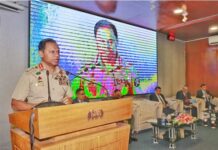While political turmoil roils South Asian nation, strike calls have cut off farmers from markets, leading to hardship. |
||||||

With their employer unable to sell his produce, workers sometimes have to go without pay [Al Jazeera]
|
||||||
| Pabna, Bangladesh – Sidiqur Moyez’ farm has not seen such tough times since the huge 1998 floods in Bangladesh wiped out his fruits.
This time his crop is perfect. However, much of it is going to waste in the hot sun in northern Bangladesh. Ongoing political turmoil has led to violence and mass strikes, which have hampered rural communities – especially farmers like Moyez who can’t get his produce to market. Moyez and his wife stroll through fields of bananas, lychees, potatoes, eggplants, and goji berries – 60 hectares of healthy, abundant produce. But soon they come across a pile of potatoes rotting in the sun as flies buzz overhead. The vegetables went bad because Moyez couldn’t get the potatoes to the market on time. Now, his workers are frantically picking through the decaying piles to gather what is salvageable.
The previous two days have seen the roads surrounding his farm abandoned, everyone fearful of driving. Opposition parties had imposed a hartal – the local term for a general strike – which often turn violent with activists throwing small explosives at vehicles to enforce the shutdown. “Because of the hartals, Bangladeshi farmers are being destroyed. It will take 10 years to cover these losses,” Moyez told Al Jazeera. Most people here won’t risk their expensive trucks to get vegetables to markets, and the markets wouldn’t be open anyway as the called strike was a countrywide event. “The vehicles are supposed to go, but they won’t let them go. Once it goes on the road, they might destroy it. A vehicle costs more than $25,000,” Moyez said. Those enforcing the hartals say they don’t target produce trucks on the way to market, but that is not the reality here. Farmers in northern Bangladesh are now appealing for more respect for their crucial trade. War Crimes Tribunals Muslim opposition parties have organised repeated hartalssince December in response to the War Crimes Tribunal verdicts in the capital Dhaka. The court is trying and convicting members of the opposition Bangladesh Nationalist Party (BNP) and Jammat-e-Islami party for alleged war crimes committed during the bloody 1971 war of independence from Pakistan.
Prime Minister Sheikh Hasina set up the tribunal in 2010 to investigate abuses during the war that claimed about 3 million lives and, according to the government, during which thousands of women were raped. The tribunal has been criticised by rights groups for failing to adhere to international standards of due process. When senior Jamaat party figure Delwar Hossain Sayeedee was sentenced to be hanged last month, a nationwide protest strike sparked violence on the streets of urban and rural areas alike. Vehicles were torched or bombed and clashes between protesters and police resulted in several dozen deaths. Strikes have been sporadically called over the past few months, and rural farmers have suffered as a consequence. Moyez, like most other farmers in Bangladesh, doesn’t have expensive refrigeration facilities for times when the markets are disrupted. “We could make up for it if we had a vegetable cold storage, then we could keep it inside and when the hartal ends it will go back to the market slowly,” he said, anxiously watching his workers sort through more crops. Worker backlash It is the farm workers who suffer most. Each one earns about $3 a day and relies on every penny to buy rice, cooking oil, and other household expenses. Moyez said he has about 200 workers and hasn’t been able to pay them for the last week. The interest on his loans is a more pressing financial concern, he said. “Now that I am making a loss, I’m not able to pay them on time. I’m making a loss but the bank won’t let it go,” he said. Moyez’ son was recently stopped by some of his farmhands while driving a motorcycle. They told him they needed money and stole his motorbike. In a field with workers clawing through earth for crops, Moyez explained that some are continuing to show up on the promise that their salaries will eventually come. In such rural areas in Bangladesh, they have little choice for other work if they walk away from the farm.
Busily digging potatoes, Abdur Razzak said he has four children at home and is struggling to keep them fed. He sympathized with his employer, but said the weight of his own financial plight distracts him during his work. “Because he can’t pay us, when we come to work our minds feel heavy. I feel sad that I didn’t get the money because my children’s education and family’s future has become a problem,” Razzak told Al Jazeera. Nearby, another farmhand Jamal Uddin took a break from filling baskets with potatoes. He expressed pessimism about the future. “I have no rice, I have no oil, I have no money. There are lots of problems emerging now,” he said. Long-running animosity Political rivalry between Hasina’s Awami League government and the opposition BNP led by arch foe Khaleda Zia has plagued Bangladesh for years. General strikes called by both sides of the political divide in the country have proven costly. Few hard figures exist, but local press reports say the politically driven strikes cost Bangladesh’s economy $250mn per day. A 2005 United Nations Development Programme report found during the 1990s hartals were siphoning off 3-4 percent of the country’s annual GDP. “These costs include foregone earnings and lost employment and output as well as long term impacts due to reduced savings, indebtedness, capital losses and reduced profitability for businesses,” the report stated. “Hartal also impose non-economic costs on people, including considerable psychological stress and personal insecurity.” Moyez said he cannot fathom that politics could be more devastating to his farm than unruly weather patterns.
The longer the political turmoil continues, the more millions of impoverished Bangladeshis trying to survive on farm wages will suffer. The War Crimes Tribunal has sentenced just three out of 12 of opposition leaders accused of crimes committed in 1971. The Jamaat party and its allies, meanwhile, have announced another strike to begin on Tuesday in response to the arrest of a student-wing leader. This hartal, they say, will be indefinite until he’s released. The farmhands here say far-away political bickering should not be imposing such economic hardship on rural labourers. “Those involved in politics, the disturbances are happening with them. The ordinary man has nothing to do with this,” said Razzak, before getting back to work. Source: Al jazeera |











